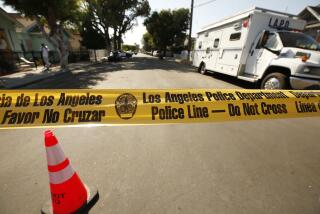Boston Unnerved by Ashcroft’s Warning of Possible Threat
- Share via
BOSTON — As word spread Friday that Atty. Gen. John Ashcroft personally had telephoned both Massachusetts’ acting governor and Boston’s mayor to warn them of possible weekend terrorist attacks here, this already nervous city moved closer to the edge.
The extraordinary tips forwarded by Ashcroft, local officials struggled to explain Friday, had been investigated and dismissed. But many people who already had heard the news warning of possible mayhem had had enough.
“Bye-bye,” said Jeff Miller, a truck driver who lives about an hour outside the city. “I’m going home and I’m not coming back any time soon. I’m tired of this.”
Beyond New York and Washington, D.C., perhaps no other city has been more shaken by the Sept. 11 terrorist attacks than this one.
Both of the planes that crashed into the World Trade Center had taken off from Logan International Airport here; some of the hijackers had been living here at the time of the attacks, authorities believe, as had others in previous years; and many suspects in the plot reportedly had spent time in this historic city.
On Friday, armed military patrol boats cruised Boston Harbor, their heavy machine guns visible from a distance. Flak-jacketed federal agents wearing Kevlar helmets and carrying assault rifles now stand guard at Logan.
And officials tried repeatedly throughout the day to calm the city and quell what had become a minor exodus. City leaders issued live statements on TV, reiterating that the leads passed along by the nation’s most powerful law enforcement officer late Thursday had been false.
But the image of the leaders promising over and over that everything was fine, but also refusing over and over to say why it was fine, seemed only to heighten residents’ sense of dread.
“This is a time to stand up to fear,” said state Atty. Gen. Tom Reilly. “We cannot allow fears and rumors to affect our lives. . . . Go to your favorite restaurant. Go. Live your lives.”
Said Boston Police Chief Paul Evans: “Are we going to frighten an entire populace based on what nobody knows?”
The answer, it seemed, was yes.
A plumber from nearby Somerville said he’d try to sell his tickets to Sunday’s New England Patriots game--or he’d just toss them. “Don’t go into downtown,” a man was overheard saying during a call on his cellular phone. “Go fishing.”
The FBI did little to calm nerves. Spokeswoman Gail Marcinkiewicz in the agency’s Boston office repeated throughout the day a mantra-like: “The threats do not appear credible.” But she offered no details either, adding only that the FBI would notify people if a threat did indeed appear credible.
In the meantime, the state and city are testing water supplies to ward off chemical or biological attacks. Police guard all the city’s tunnels, the entrances to a massive $14.5-million construction project called the Big Dig, the bridges to Cape Cod.
Acting Gov. Jane Swift no longer holds her news conferences outside her office, instead cramming security guards, aides, reporters and TV crews into a small interior room.
The costs of the fear are escalating quickly--the totals, in turn, generating more fear.
This is typically the busiest time of year for many hotels here, as tourists pour in to see New England’s leaves turn the earthy hues of autumn. Hotel occupancy rates throughout the city average nearly 95%. Friday, that average was 40%
At the Westin Copley Place Hotel--where agents staged a massive raid last week, arresting an innocent Saudi family--fewer than 400 of the 800 rooms are filled. The Marriott Long Wharf is also at about 50% occupancy--but 15% of its occupied rooms were let to law enforcement officers, including agents from the Border Patrol, U.S. Marshals Service and FBI.
Taxi drivers, most of whom lease their cabs for about $80 a day, are finishing 10-hour shifts with $40 in their pockets. It costs them $40 to go to work.
In between efforts to calm Bostonians, Swift held an emergency meeting Friday with tourism officials to try to shore up, and perhaps bail out, the state’s $14 billion-a-year tourism industry.
Pat Moscaritolo, head of the Greater Boston Convention and Visitors Bureau, was at the meeting. Afterward, he wasn’t especially optimistic.
“We thought a few days ago it couldn’t get worse,” Moscaritolo said. With the most recent scare, “It’s like, head to your bomb shelter, don’t go to Boston.”
More to Read
Sign up for Essential California
The most important California stories and recommendations in your inbox every morning.
You may occasionally receive promotional content from the Los Angeles Times.













